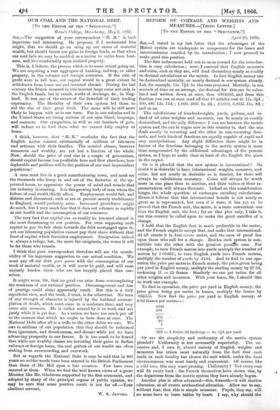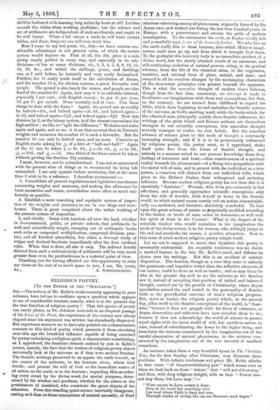REFORM OF COINAGE AND WEIGHTS AND MEASURES.—[THIRD LETTER.]
[To THE EDITOR OF THE " SPECTATOR."9
April 20, 1866.
stated in my last letter that the advantages of the Metric system are inadequate to compensate for the losses and inconveniences entailed by its introduction ; I now proceed to make good this position.
The first inducement held out to us as reward for the introduc- tion is easy calculation ; now, I contend that English measures and coins, such as they are, will lend themselves nearly as readily to decimal calculations as the metric. In fact English money can be decimalized mentally, so nearly decimal is our system already.
Let, for example, 13s. 71d. be the sum proposed. Mentally, in ten seconds of time on an average, the decimal for this can be calcu- lated and written down at once, thus -6864583, and from this fraction you can at once read off that 10 articles cost 61. 17s. 3 d. ; 100, 681. 12s. 11d. ; 1,000, 6861. 9s. 2d. ; 10,000, 6,8641. lls. 8d. ; and so on.
The subdivisions of hundredweights, yards, gallons, and in- deed of all other weights and measures, can be nearly as readily decimalized, and the only difference I can see between the metric system and the one in vogue now in this country is, that the one deals mostly in recurring and the other in non-recurring deci- mals, and both kinds of fractions are equally capable of rapid and easy manipulations. Any slight difference there might be in favour of the fractions belonging to the metric system is more than compensated by the additional advantages of the present system, as I hope to make clear at least of the English 20s. piece in the sequel.
Or is it pleaded that the new system is international? No doubt it is desirable to have international weights, measures, and coins, but not nearly as desirable as is fancied, for there will always be calculations necessary. Coins will always be worth more in one place than in another, and their values or their re- presentatives will always fluctuate. Indeed on this consideration hinges the whole question of exchanges entailing calculations. Hence it follows that this international benefit is not nearly so great as is represented, but even if it were, it has yet to be proved that the French unit, the metre, is a more convenient one than the English unit, the foot ; for on that plea only, I take it, can this country be called upon to make the great sacrifice of a change.
I hold that the English foot is much preferable to the metre, and the French ought to accept that, and make that international. At all events it is. foot versus metre, and the onus of proof lies upon those who call for a change. Besides each system is con- vertible into the other with the greatest possible ease. For example, to turn French metres into yards multiply the number of metres by 1.09363 ; to turn English yards into French metres, multiply the number of yards by -9144. And to find in one ope- ration the price per metre in French money, the price given being per yard in English money, multiply the sterling money by 27.34, reckoning 1/. = 25 francs. Similarly we can get ratios for all other weights and measures. With your leave, Sir, I should like to work one example.
To find in operation, the price per yard in English money, the price given being per metre in francs, multiply the francs by -036575. Now find the price per yard in English money, at 8'82 francs per metre- 0366 288 293 • 29 1 •323 = 3 florins 23 farthings = 6s. 51-d. per yard.
Or are the simplicity and uniformity of the metric system pleaded ? Uniformity is not necessarily superiority. The ex- cessive and, I own it, absurd variety of English weights and measures has arisen most naturally from the fact that each trade in each locality has chosen the unit which, under the local circumstances, was most handy and convenient. Of course, like a wild tree, this may want pruning. Uniformity? Not every coat will fit every back ; the French themselves have shown this, by the departures from the metric system they have already begun.
Another plea is often advanced—this, forsooth—it will shorten education, at all events arithmetical education. Allow me to say, without fear, that this is simple nonsense. Pupils, they say, will no more have to learn tables by heart. I say, why should the child be bothered with learning long tables by heart at all? Let him consult the tables when working problems ; but the science and art of arithmetic are independent of such accidentals, and ought to be well learnt. When a lad enters a trade he will want certain tables, and those, frequent use will soon teach him.
Now I come to my last point, viz., this—we have certain con- siderable advantages in our present coins, of which the metric system would deprive us. First of all, the 20s. piece is a coin pretty nearly perfect in every way, and especially in its sub- divisions—it has so many divisions, viz., 2, 3, 4, 5, 6, 8, 10, 15, 16, 20, &c., and withal the shillings, pence, and farthings can, as I said before, be instantly and very easily decimalized. Further, the 1/ easily lends itself to the calculation of dozens, and the number 12 is, for obvious reasons, a great favourite with people. The pound is also handy for scores, and people are also fond of the number 20. Again, how easy it is to calculate interest, especially 5 per cent., with English money ; is. per 41. per year, 1d. per 1/. per month. Done mentally and at once. Can these things be done with the franc ? Again, the pound can so readily be halved-10s., and halved again-2s. 6d., and halved again- 18.3d, and halved again-70., and halved again-3N. Now this division by 2, or the binary system, is of the utmost convenience for high and low ; we like to " split the difference." Wehalve and halve again and again, and so on; it is on that account that in Teutonic weights and measures the number 16 is such a favourite. But the number 10 can only be halved once, and no more. Conceive an English rustic asking for 137s of a litre of " half-and-half !" A gain of the 1/. can be taken = 6s. 8d., 3s. 4d., . =1s. 8d., A -- 10d., and A = 5d. One-third of the franc cannot be taken without getting the fraction 33} centimes.
I must, however, not be misunderstood. I am not so enamoured with the present state of things as to recommend its being left untouched. I am only against violent revolution, but at the same time I wish to be a reformer. I therefore recommend :- 1. Consolidate all present regulations and legislative enactments concerning weights and measures, and making due allowance for local necessities and wants, nevertheless strive after as much uni- formity as possible.
2. Establish a more searching and equitable system of inspec- tion of the weights and measures in use in our shops and ware- houses. There is great complaint about the unfair working of the present system of inspection.
3, and chiefly. Insist with teachers all over the land, whether in Governmental, public, or private schools, that arithmetic be well and scientifically taught, sweeping out of arithmetic books such rules as compound multiplication, compound diVision, prac- tice, and all kindred absurdities, but claim a thorough study of vulgar and decimal fractions immediately after the four cardinal rules. When that is done, all else is easy. The indirect benefit derived from such a rational study of arithmetic will be very much greater than even the profitableness in a material point of view.
Thanking you for having afforded me this opportunity to state my views at the cost of so much space to you, I am, Sir, yours,































 Previous page
Previous page